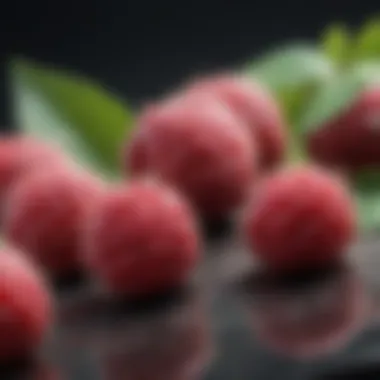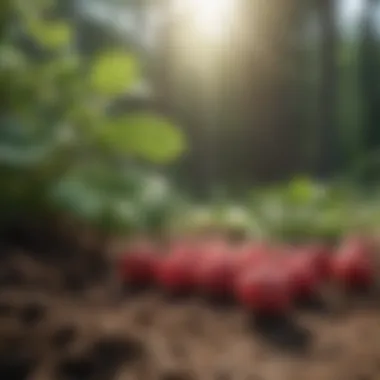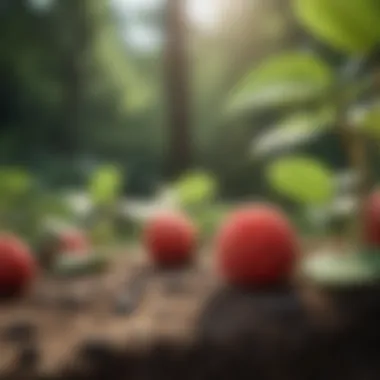Choosing the Ideal Raspberry Varieties: A Comprehensive Guide for Cultivation Success


Raspberry Varieties Guide
Selecting the Best Raspberry to Grow
This comprehensive guide delves into the nuanced process of choosing the ideal raspberry variety for cultivation. The endeavor encompasses various facets from climate adaptability and taste profiles to growth characteristics and disease resilience, offering indispensable insights for individuals venturing into raspberry farming.
Climate Suitability
Understanding the climate suitability is fundamental when choosing the best raspberry variety for cultivation. Raspberries thrive in temperate climates with well-drained soil and adequate sunlight exposure. Depending on your region's climate, you can opt for cultivars that excel in cooler temperatures or those resilient to heat spells.
Flavor Profiles
The flavor profile of raspberries varies across different cultivars, ranging from tart and tangy to sweet and aromatic. Some varieties boast a bold, intense flavor ideal for fresh consumption, while others lend themselves well to culinary applications like jam-making or baking.
Growth Habits
Each raspberry cultivar exhibits distinct growth habits, such as erect canes that stand tall and require trellising for support, or trailing canes that sprawl along the ground. Understanding the growth habits aids in planning the layout of your raspberry patch and implementing the necessary support structures.
Disease Resistance
Disease resistance is a crucial factor to consider when selecting a raspberry variety for cultivation. Certain cultivars exhibit resistance to common diseases like powdery mildew or root rot, reducing the need for chemical interventions and promoting a more sustainable growing practice.
Introduction
In the realm of horticulture, choosing the ideal raspberry variety to cultivate is a decision not to be taken lightly. When embarking on the journey of raspberry cultivation, one must navigate through a plethora of options, each with its unique characteristics and requirements. Selecting the right raspberry variety can significantly impact the success and yield of your garden or farm.
Understanding Raspberry Varieties
To embark on your raspberry-growing venture successfully, one must first delve into the nuances of different raspberry varieties. These varieties can be categorized into distinct groups based on their physical traits and growing conditions, namely red, black, and yellow raspberries. Each group hosts a selection of specific varieties with varying tastes, textures, and growth patterns.
Red Raspberry Varieties
Among the red raspberry varieties, some notable choices include Heritage, Autumn Bliss, and Tulameen. The Heritage variety is renowned for its rich flavor profile and adaptability to various climates. Autumn Bliss, as the name suggests, boasts a late-season harvest, perfect for extending your raspberry-picking season. Tulameen, on the other hand, is favored for its plump and juicy berries, making it a popular choice among raspberry enthusiasts.
Black Raspberry Varieties


For those inclined towards black raspberries, options like Cumberland, Munger, and Jewel stand out. Cumberland is celebrated for its disease-resistant properties, ensuring a healthier crop yield. Munger, with its robust flavor and firm texture, appeals to those seeking a more intense raspberry experience. Jewel, a versatile variety, thrives in different growing conditions, making it a reliable choice for farmers and gardeners.
Yellow Raspberry Varieties
In the realm of yellow raspberry varieties, Anne, Fall Gold, and Kiwi Gold present attractive options. Anne raspberries are prized for their unique pineapple-like sweetness, offering a delightful twist to the conventional raspberry taste. Fall Gold, as the name implies, ripens in the autumn months, providing a burst of color to your raspberry patch. Kiwi Gold, with its striking golden hue, adds visual interest to your garden while delivering a refreshingly mild raspberry flavor.
Understanding Raspberry Varieties
Understanding the different raspberry varieties is crucial when embarking on raspberry cultivation. Each variety has unique characteristics that affect growth, flavor, and adaptability to different climates. By exploring red, black, and yellow raspberry varieties, growers can make informed decisions based on their specific needs and environmental conditions.
Red Raspberry Varieties
When considering red raspberry varieties, three prominent options stand out: Heritage, Autumn Bliss, and Tulameen. Heritage raspberries are known for their rich flavor profile and high yield potential. Autumn Bliss, as the name suggests, thrives in the fall season, offering a sweet and juicy fruit that is highly sought after. Tulameen, another popular choice, boasts a delicate balance of sweetness and tartness, making it a versatile option for various culinary uses.
Heritage
Heritage raspberries are prized for their exceptional flavor, making them a favorite among growers and consumers alike. Their intense aroma and well-balanced sweetness make them a top choice for fresh consumption or culinary applications. Additionally, Heritage raspberries exhibit excellent disease resistance, ensuring a healthy harvest with minimal intervention required.
Autumn Bliss
Autumn Bliss raspberries are revered for their late-season availability, providing a welcome addition to fall harvests. The berries are plump and flavorful, making them ideal for jams, sauces, and desserts. One key advantage of Autumn Bliss is its resilient nature, thriving in diverse climates and soil conditions.
Tulameen
Tulameen raspberries are known for their medium to large fruit size and attractive bright red color. These berries are prized for their firm texture and sweet taste, making them a popular choice for fresh consumption. Tulameen plants exhibit vigorous growth and high productivity, ensuring a bountiful harvest throughout the growing season.
Black Raspberry Varieties
In the realm of black raspberry varieties, options like Cumberland, Munger, and Jewel offer distinctive characteristics that cater to different growing preferences. Cumberland black raspberries are prized for their bold flavor and large fruit size, making them a favorite for fresh eating and baking. Similarly, Munger black raspberries are known for their exceptional sweetness, adding a delightful twist to various culinary creations. Jewel black raspberries, with their striking deep color and robust flavor, are sought after for their ornamental appeal and delectable taste.
Cumberland
Cumberland black raspberries are known for their rich, complex flavor profile, combining sweetness with a subtle tartness. These berries are versatile, suitable for fresh consumption, baking, and preserving. One of the standout features of Cumberland raspberries is their resilience to common raspberry pests and diseases, ensuring a healthy crop yield.
Munger


Munger black raspberries are celebrated for their exceptional sweetness, making them a popular choice for fresh eating and dessert-making. The berries exhibit a delicate balance of sugars and acids, creating a satisfying flavor profile that appeals to discerning palates. Munger plants are robust and disease-resistant, thriving in various climatic conditions.
Jewel
Jewel black raspberries are prized for their deep purple-black color and bold, sweet flavor. These berries make a stunning addition to fruit salads and desserts, imparting a rich, distinctive taste. Jewel raspberry plants are low-maintenance and prolific, producing abundant harvests year after year.
Yellow Raspberry Varieties
Yellow raspberry varieties, including Anne, Fall Gold, and Kiwi Gold, offer a unique twist on traditional raspberry cultivars. Anne yellow raspberries are renowned for their delicate aroma and subtle sweetness, making them a delightful choice for fresh consumption. Fall Gold raspberries, with their vibrant golden hue and luscious flavor, add visual appeal to culinary creations while providing a burst of tangy sweetness. Kiwi Gold raspberries stand out for their tropical flavor profile, reminiscent of kiwi fruit, making them a refreshing and exotic option for adventurous growers.
Anne
Anne yellow raspberries feature a distinct golden hue and a mild, sweet flavor that appeals to a wide audience. These raspberries are a versatile option for various culinary uses, from incorporating into salads to creating vibrant desserts. Anne raspberry plants are resilient and easy to cultivate, making them an excellent choice for novice growers.
Fall Gold
Fall Gold raspberries are prized for their striking golden color and succulent texture, adding a touch of elegance to dishes. The berries possess a perfect balance of sweetness and acidity, making them a versatile ingredient for jams, sauces, and preserves. Fall Gold raspberry plants exhibit strong disease resistance and consistent productivity, making them a reliable choice for both amateur and experienced growers.
Kiwi Gold
Kiwi Gold raspberries offer a unique flavor profile reminiscent of tropical fruits like kiwi, bringing a fresh and exotic appeal to berry enthusiasts. The berries boast a vibrant orange-yellow color and a refreshing taste that pairs well with both sweet and savory dishes. Kiwi Gold raspberry plants thrive in warm climates and require minimal maintenance, making them a delightful addition to home gardens and orchards.
Factors to Consider When Choosing Raspberry Varieties
When delving into the realm of selecting raspberry varieties for cultivation, a crucial aspect is understanding the various factors that come into play. These considerations serve as the guiding principles for choosing the most suitable raspberry type for your growing environment. Factors such as climate suitability, flavor profiles, growth habits, and disease resistance play pivotal roles in determining the success of your raspberry cultivation venture. By carefully evaluating these criteria, you can ensure a thriving raspberry garden that fulfills your expectations.
Climate Suitability
One of the primary factors to contemplate when selecting raspberry varieties is their adaptability to the climate in which they will be grown. Raspberry plants exhibit different preferences when it comes to temperature, sunlight, and moisture levels. Understanding the specific climate requirements of each variety is essential to maximize their growth potential. Some raspberries thrive in colder climates, while others are more suited to warmer regions. By choosing raspberry varieties that align harmoniously with your local climate conditions, you can set the stage for a bountiful harvest.
Flavor Profiles
The distinct flavor profiles of raspberry varieties add a layer of complexity to the selection process. Each raspberry cultivar carries its unique taste profile, ranging from sweet and tangy to subtle and aromatic. When choosing raspberry varieties based on flavor, consider your personal preferences and intended culinary use. Some raspberries are ideal for fresh consumption, while others excel in jams, preserves, or baking. By exploring the diverse flavor profiles offered by different raspberry types, you can curate a garden that caters to your taste preferences and culinary ambitions.
Growth Habits


Beyond taste and climate adaptability, understanding the growth habits of raspberry varieties is essential for effective cultivation. Factors such as plant size, branching patterns, and fruiting cycles influence how raspberries grow and spread in your garden. Some varieties produce fruit on primocanes, while others bear fruit on floricanes. By selecting raspberry varieties with growth habits that align with your gardening goals and space constraints, you can optimize your garden layout for efficiency and productivity.
Disease Resistance
Disease resistance stands as a key consideration when choosing raspberry varieties to grow. Different raspberry cultivars exhibit varying levels of resistance to common diseases and pests that can impact plant health and yield. By selecting disease-resistant varieties, you can minimize the risk of fungal infections, root rot, or pest infestations that could jeopardize your raspberry harvest. Prioritizing disease resistance in your selection process contributes to the long-term health and sustainability of your raspberry garden, ensuring continued success year after year.
Best Raspberry Varieties for Different Climates
In the realm of raspberry cultivation, understanding the nuances of climate and its impact on the choice of raspberry varieties is paramount. The section on Best Raspberry Varieties for Different Climates in this comprehensive guide serves as a cornerstone for growers seeking to maximize their plant's potential in varying environmental conditions. By delving into the specific elements, benefits, and considerations concerning raspberry varieties best suited for different climates, this section equips readers with essential knowledge to make informed decisions. Whether nestled in chilly terrains, basking in warm sun rays, or experiencing temperate conditions, selecting the proper raspberry variety tailored to the climate ensures optimal growth and yield.
Cold Climates
For regions enshrouded in chilly winters and frosty landscapes, the selection of raspberry varieties resilient to such harsh conditions becomes a necessity. The Cold Climates subsection delves deeply into identifying raspberries that not only survive but thrive in low-temperature environments. By exploring the characteristics of varieties capable of enduring frost and cold snaps, readers gain insights into cultivars that exhibit robust growth and fruit production even in icy settings. Factors such as cold hardiness, late flowering tendencies, and winter protection techniques form the crux of considerations when venturing into raspberry cultivation within cold climates.
Warm Climates
In sun-drenched locales with tropical hues, the dynamics of raspberry cultivation shift towards varieties that flourish under the gentle caress of warm climates. The Warm Climates section elucidates the ideal raspberry varieties suited for these balmy environments, where considerations revolve around heat tolerance, moisture requirements, and sun exposure. By delving into the nuances of selecting raspberries that bask in the warmth without compromising productivity, readers can navigate the intricacies of nurturing thriving raspberry plants amid the sweltering heat of warm climates.
Temperate Climates
Navigating the mild yet fluctuating temperament of temperate regions demands a strategic approach to choosing raspberry varieties that strike a harmonious balance. The Temperate Climates segment imparts valuable insights into selecting raspberries that can adapt to the moderate climate conditions characterized by defined seasons. Factors such as versatility in temperature tolerance, resistance to temperature fluctuations, and adaptability to varying weather patterns take precedence when identifying raspberry varieties conducive to flourishing in temperate climates. By dissecting the traits of raspberries best suited to these moderate environments, readers gain a comprehensive understanding of cultivating raspberries harmoniously within temperate climates.
Recommended Raspberry Varieties for Beginners
In the expansive realm of raspberry cultivation, selecting the appropriate variety is a crucial initial step, especially for novices venturing into this verdant domain. The section focusing on Recommended Raspberry Varieties for Beginners within this comprehensive guide carries substantial weight, serving as a beacon for those at the threshold of their raspberry-growing journey. For individuals embarking on this horticultural odyssey, understanding the nuances and distinct characteristics of recommended raspberry varieties holds paramount importance.
The essence of this section lies in its ability to elucidate the intricacies of choosing the right raspberry strains for beginners, shedding light on the specific attributes that make certain varieties more suitable for those nascent in the world of cultivation. As neophytes navigate the labyrinth of raspberry options, guidance on recommended varieties paves a smoother path towards fruitful harvesting and gratifying outcomes.
First and foremost, the section delves into the pivotal elements that dictate the selection of raspberry varieties for beginners. Factors such as adaptability to varying climates, resistance to common diseases, and maintenance requirements take center stage in aiding novice growers make prudent choices. By dissecting the intricacies of each recommended variety, individuals are equipped with invaluable insights that foster informed decision-making.
Furthermore, the benefits inherent in opting for recommended raspberry varieties are manifold. Enhanced disease resistance not only ensures a healthier crop but also alleviates the burden of intensive pest management, offering beginners a less daunting cultivation experience. Moreover, certain varieties boast superior flavor profiles, treating growers to a sensory journey that transcends the ordinary, making the process not only fruitful but also gratifying to the palate.
The considerations surrounding recommended raspberry varieties for beginners extend beyond mere cultivation aspects to encompass broader implications. A deep dive into growth habits, fruiting patterns, and harvest seasons empowers novices with a comprehensive understanding of their chosen varieties, setting the stage for a successful and fulfilling cultivation venture.
Conclusion
In the realm of raspberry cultivation, the conclusion serves as the pivotal moment where all the information provided culminates into actionable insights for growers. It effectively ties together the nuances of selecting raspberry varieties, making it a critical endpoint in the understanding of this intricate process. By synthesizing the key points discussed throughout the guide, readers gain a holistic view of the considerations that go into choosing the best raspberries to grow.
The importance of the conclusion lies in its ability to empower growers with knowledge. It elucidates the significance of factors such as climate suitability, flavor profiles, growth habits, and disease resistance in determining the success of raspberry cultivation. Without a well-rounded grasp of these elements, growers may struggle to make informed decisions when selecting raspberry varieties.
Moreover, the conclusion acts as a guiding light for beginners venturing into the world of raspberry growing. It streamlines the vast array of information presented in earlier sections, offering a comprehensive roadmap that navigates them through the intricacies of variety selection. This aspect is particularly beneficial for individuals new to raspberry cultivation, as it simplifies what could otherwise be an overwhelming process.
In essence, the conclusion serves as more than just a summary; it encapsulates the essence of the entire guide on selecting raspberry varieties. It equips readers with the knowledge and understanding needed to make educated choices about the raspberries they wish to cultivate, elevating their gardening endeavors to a more informed and successful level.







